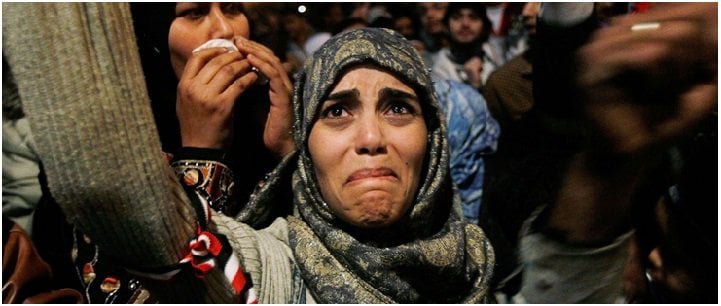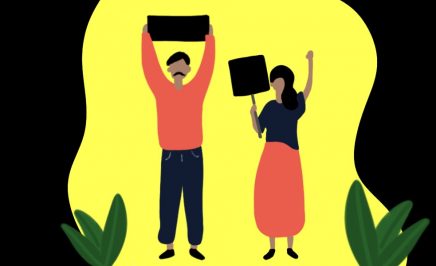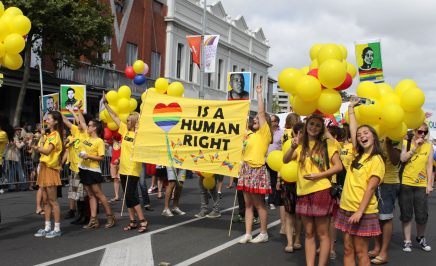While we hoped that 2017 wouldn’t deal us the same cruel blows as its predecessor, it seems we’re yet to see the light at the end of the tunnel. Whether it’s fretting over President Trump’s intent to reinstate a ban on transgender individuals from serving in the US armed forces, or agonising over the ongoing atrocities of the Syrian civil war and refugee crisis, it’s easy to feel completely overwhelmed by the state of the world.
But burying our misery in a tub of ice cream and a box of tissues isn’t going to make change – in fact, Amnesty’s Director of Communications, Osama Saeed Bhutta says events like Trump’s presidency can actually “renew the global human rights project”.
So how can we keep our spirits up as we seek to improve human rights? We asked the experts.
Establish boundaries
There’s no denying the crucial importance of activism, but if you’re not looking after yourself then you can’t do a very good job of helping others. Activists who are exposed to distressing events or imagery are at risk of vicarious trauma, which can lead to burnout, compassion fatigue or secondary traumatic stress.
“Part of the reason we see so much burnout is the guilt of ‘I have to be involved all the time’,” says Dr Peggy Kern, senior lecturer in the University of Melbourne’s Centre for Positive Psychology. “The best way you can help others is by taking time out for yourself – it might feel like you are being selfish but if you burn out, you won’t help anyone.”
“Part of the reason we see so much burnout is the guilt of ‘I have to be involved all the time'”
Dr Kern
Dr Kern suggests establishing clear boundaries of when you will focus on the issues that concern you and also allow time for lighter thoughts or activities. “You need to check in and check out,” she explains. “For a period of time you focus on [the cause] but then you have an outlet – something that’s healthy and recharges you at a core level.”
That’s something Belinda Lowe, Amnesty Activism Growth and Development coordinator, has learnt over 15 years of activism. “You have to make sure you have clear periods of time when you do your work and also when you have family or friend time,” she says. “I like to paint and exercise – you need to find activities that stimulate a different part of your brain and allow you to learn new skills.”

Recruit an A-team
The former US First Lady Michelle Obama says she relies heavily on her network to keep her balanced – and we should all follow suit.
“When I’m unhappy with something, people know because I don’t want to hold onto it,” Mrs Obama told Prevention. “I’d rather deal immediately with the stuff that bothers me, so using my network – my girlfriends, my husband, my mum – I talk a lot, I vent. Even if there are no answers, sharing the emotions helps keep me stable.”
“The best way you can help others is by taking time out for yourself – it might feel like you are being selfish but if you burn out, you won’t help anyone”
Dr Peggy Kern
Sometimes banning certain conversation topics can be a good way of keeping a social catch-up light, and ensuring you don’t find yourself debating foreign policy or fretting over a particular person’s plight.
“I’m part of a book club with lots of activists and we have a law that we are not allowed to talk about human rights abuses,” Lowe says. “We call each other on it so we make sure we have time to nurture relationships.”
Celebrate the wins
It might feel like the problems of the world are insurmountable, but Lowe says it’s worth remembering how much has already been done and how people can come together when their rights are in jeopardy.
In the beginning of 2017, millions of people around the world took to the streets to voice their opposition to the hateful rhetoric of President Donald Trump and to stand up for gender equality. Look at how much we have already achieved for the rights of women, refugees and LGBTQI people,” Lowe says.
A good way to keep positive is to keep tabs on Amnesty’s success page or create a portfolio or box of mementos that celebrate what you’ve achieved.
“It’s your collection of success stories or images or items that represent success,” Dr Kern says. “Go back to that every so often and when things get challenging go, ‘I remember this story when things worked’.”
Look for good news stories (and kittens)
As much as you might feel an urgent need to keep tabs on the latest happenings in Iraq or the Gaza Strip, note that research shows that people who are exposed to more than six hours of daily coverage of a disaster are more likely to feel despairing and irritable with a loss of identity and sense of failure.
“When we meet real tragedy in life, we can react in two ways – either by losing hope and falling into self destructive habits, or by using the challenge to find our inner strength”
Dali Lama
Dr Kern suggests actively seeking out good news stories to temper the bad. “We have a bias where we immediately tune in on the negative stuff,” she explains. “We stress each other out passing on bad news but passing on uplifting hero stories can shift our conversations.”
For Lowe, funny cat videos can lighten the load. “I used to think cat videos were really stupid but the longer I have been an activist the more valuable I think they are,” she says. “Cute animal videos and looking for stories of people being kind or caring are really important.”
Reconnect with your values
As the Dalai Lama says, “When we meet real tragedy in life, we can react in two ways – either by losing hope and falling into self destructive habits, or by using the challenge to find our inner strength”.
So if you’re feeling overwhelmed by the atrocities of the world, then try to remember why you began the fight in the first place. “Come back to why you are doing what you are doing,” Dr Kern says. “Remind yourself, ‘This is what got me here and this is the reason for it and this is what I care about’.”
For more on the topic, Lowe recommends Aftershock: Confronting Trauma in a Violent World: A Guide for Activists and Their Allies, by Pattrice Jones.
Article by Kim Gillan
Amnesty International Australia is leading the way in protecting and defending human rights. Over the next five years, we’ll strive for systemic change on the human rights issues that are vital to our allies, partners, and the people of Australia. Our vision is to sustain the ground so many fought hard to and take purposeful action to further advance human rights. View our Australian campaigns.










